Global AI in Life Sciences Market is estimated to be worth USD 25.2 Billion in 2022 and is projected to grow at a CAGR of 9.4% between 2023 to 2032. The study has considered the base year as 2022, which estimates the market size of market and the forecast period is 2023 to 2032. The report analyzes and forecasts the market size, in terms of value (USD Billion), for the market. The report segments the market and forecasts it by type, by component, by delivery model, by application, by end user and region/country.
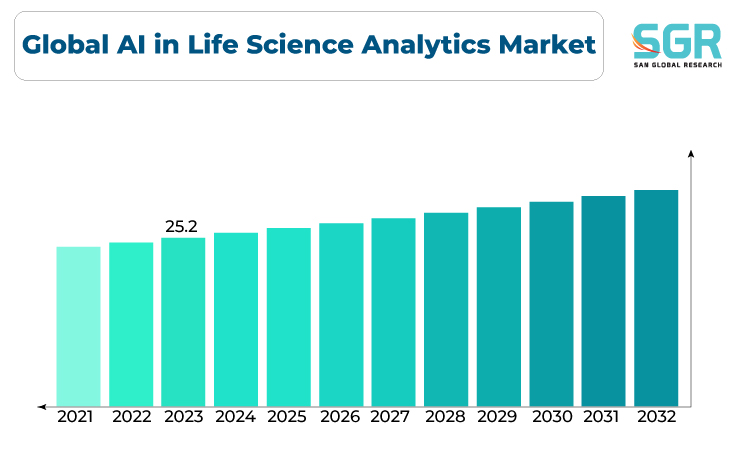
The Global AI in Life Science Analytics market represents a transformative intersection where artificial intelligence (AI) and life sciences converge, revolutionizing research, drug discovery, patient care, and operational efficiencies within the healthcare and pharmaceutical sectors. AI-driven analytics solutions are redefining the life sciences landscape by leveraging machine learning algorithms, predictive analytics, and big data to analyze vast amounts of biological, clinical, and real-world data. These advanced analytics tools facilitate personalized medicine, accelerating drug development processes, identifying potential therapies, and optimizing clinical trials through data-driven insights. Furthermore, AI in life science analytics enhances patient outcomes by enabling healthcare providers to make informed decisions, tailor treatments, and predict disease patterns more accurately. The market's growth is driven by the increasing volume of healthcare data, the need for precision medicine, and the quest for more efficient drug discovery processes, positioning AI as a transformative force driving innovation and progress within the life sciences industry.
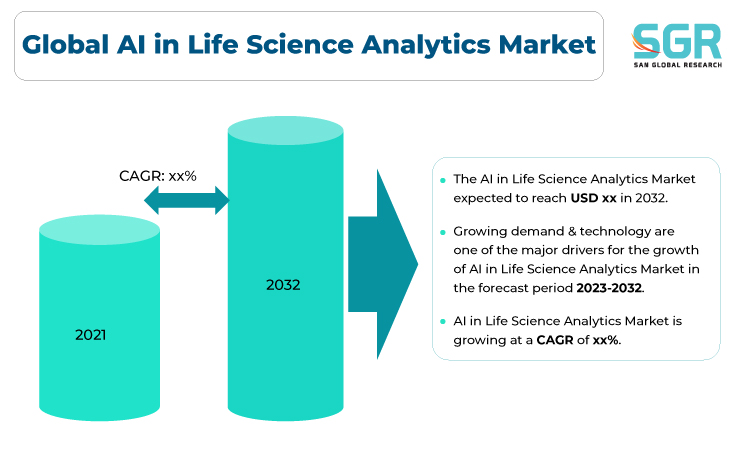
Region wise Comparison:
United States and Canada lead the adoption of AI in life science analytics, with a robust healthcare system and significant investments in AI-driven technologies for drug discovery, genomics, personalized medicine, and clinical research. The presence of leading pharmaceutical companies and tech firms drives innovation and collaboration in this domain.
Western European countries, including the UK, Germany, France, and others, exhibit strong AI adoption in life science analytics. These nations focus on leveraging AI for drug development, healthcare data analysis, genomics research, and improving patient outcomes. Collaborative initiatives and research partnerships contribute to advancements in this field.
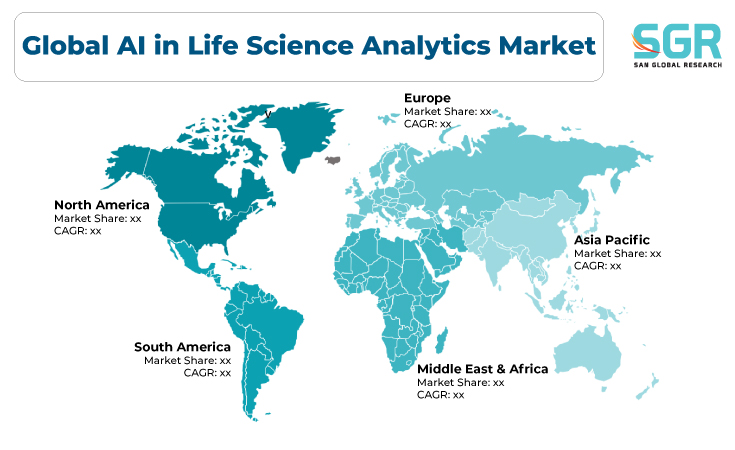
Countries like China, Japan, South Korea, and India are increasingly investing in AI for life science analytics. These nations are exploring AI applications in genomics, drug discovery, and precision medicine. Growing healthcare infrastructure and research collaborations drive the adoption of AI-driven analytics in the region.
AI adoption in life science analytics in Latin America, Africa, and the Middle East varies and might be relatively lower due to economic constraints, limited access to advanced technology, and varying healthcare infrastructures. However, some countries are making strides in utilizing AI for healthcare data analysis and research.
The AI in life science analytics market experiences variations in adoption and investment levels across continents based on factors such as technological advancements, research capabilities, regulatory frameworks, and funding. While North America and parts of Europe lead in AI adoption within life sciences, other regions are gradually embracing AI-driven analytics to enhance healthcare outcomes, improve drug development processes, and advance research methodologies.
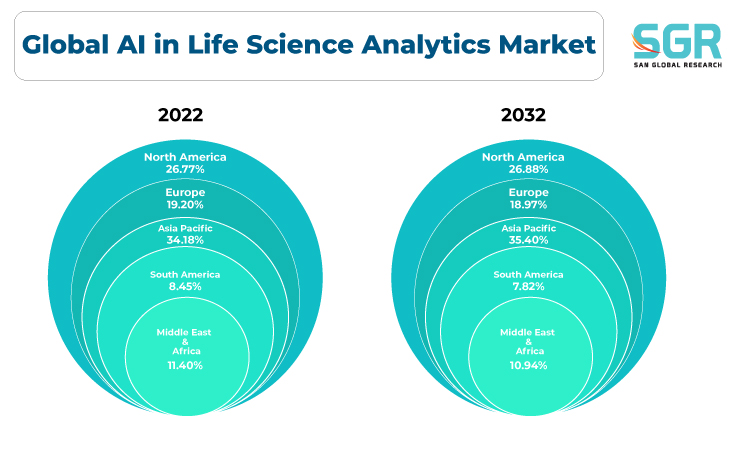
Segmentation:
The Global AI in Life Science Analytics Market is segmented by type, by component, by delivery model, by application, by end user and region/country.
By Type:
- Based on the type, the Global AI in Life Science Analytics Market is bifurcated into Descriptive, Predictive & Prescriptive Analytics – where Descriptive Analytics is dominating and ahead in terms of share.The integration of artificial intelligence (AI) in life science analytics has significantly transformed the landscape of descriptive analytics within the global market. Descriptive analytics, a fundamental aspect of AI-driven analytics, involves the analysis of historical data to understand past trends, patterns, and events within life sciences. This facet of AI applications enables pharmaceutical companies, healthcare providers, and researchers to extract valuable insights from massive volumes of data generated in the field of life sciences. By utilizing descriptive analytics powered by AI, stakeholders can gain a comprehensive understanding of patient demographics, disease patterns, treatment efficacy, and healthcare operational processes.
By Component:
- Based on the Component, the Global AI in Life Science Analytics Market is bifurcated into Services & Software – where Services is dominating and ahead of Software in terms of share.
By Delivery Model:
- Based on the Delivery Model, the Global AI in Life Science Analytics Market is bifurcated into On Premise & on Demand – where the On Premise is dominating and ahead in terms of share.
By Application:
- Based on the Application, the Global AI in Life Science Analytics Market is bifurcated into R & D, Preclinical Trials, Clinical Trials, Sales & Mktg, Regulatory Compliance, Supply Chain Optimization & Pharmacovigilance – where the R & D is dominating and ahead of others in terms of share.
By End User:
- Based on the End User, the Global AI in Life Science Analytics Market is bifurcated into Pharma & Bio Tech, Medical Devices, and Research Centers & Third Party Administrator – where the Pharma & Bio Tech Companies are dominating and ahead of others in terms of share.
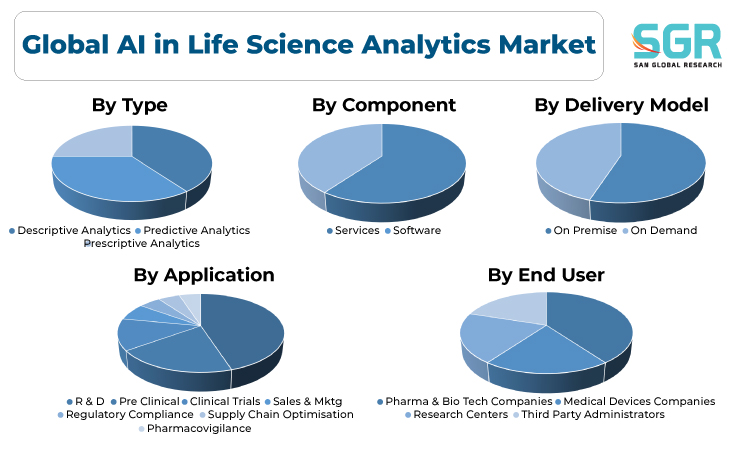
On the basis of region
- North America
- Europe
- Asia Pacific
- South America and
- Middle East and Africa
In 2022, North America is anticipated to dominate the Global AI in Life Science Analytics Market with market revenue of XX USD Million with a registered CAGR of XX%.
Key Players:
The key market players operating in the Global AI in Life Science Analytics Market include
- ORACLE
- IBM
- SAS INSTITUTE
- ACCENTURE
- IQVIA
- COGNIZANT
- WIPRO
- OPTUM
- MICROSOFT
- MAXIS IT
- COTIVITI
- AWS
Drivers:
Growing sector across the globe
The Global AI in Life Science Analytics market is propelled by several key drivers that signify its evolution and expansive growth within the healthcare and pharmaceutical sectors. Technological advancements in AI, particularly in machine learning algorithms and natural language processing, stand as a primary driver, enabling the analysis of vast and complex datasets in life sciences. The increasing volume and diversity of healthcare data, including genomics, patient records, and clinical trial information, necessitate advanced analytics tools powered by AI to derive actionable insights. Additionally, the rising demand for personalized medicine, along with the need for faster and more efficient drug discovery and development processes, drives the adoption of AI in life science analytics. Collaborative efforts between research institutions, pharmaceutical companies, and technology firms further fuel innovation, fostering the integration of AI-driven analytics solutions to improve patient outcomes, optimize healthcare delivery, and revolutionize the entire life sciences ecosystem globally.
Opportunity:
Evolving Market
The Global AI in Life Science Analytics market presents a myriad of promising opportunities that continue to reshape healthcare practices and pharmaceutical research worldwide. One significant opportunity lies in leveraging AI-powered analytics to drive advancements in precision medicine. The ability to analyze vast datasets at the individual patient level enables tailored treatments and therapies, enhancing patient outcomes and reducing healthcare costs. Moreover, AI-driven analytics offer the potential to expedite drug discovery by identifying potential candidates more efficiently, reducing research and development timelines, and facilitating the exploration of novel therapies for complex diseases. Another opportunity arises in utilizing AI in real-world evidence generation, enabling healthcare providers and researchers to harness diverse data sources for improved clinical decision-making, treatment effectiveness assessment, and post-market surveillance. Furthermore, the integration of AI in life science analytics opens doors for enhanced operational efficiencies in healthcare, such as optimizing supply chain management and streamlining administrative processes. As AI continues to advance within the life sciences, the opportunities for innovation and transformative impact across healthcare and pharmaceutical sectors remain abundant, driving the quest for improved patient care and groundbreaking medical advancements.
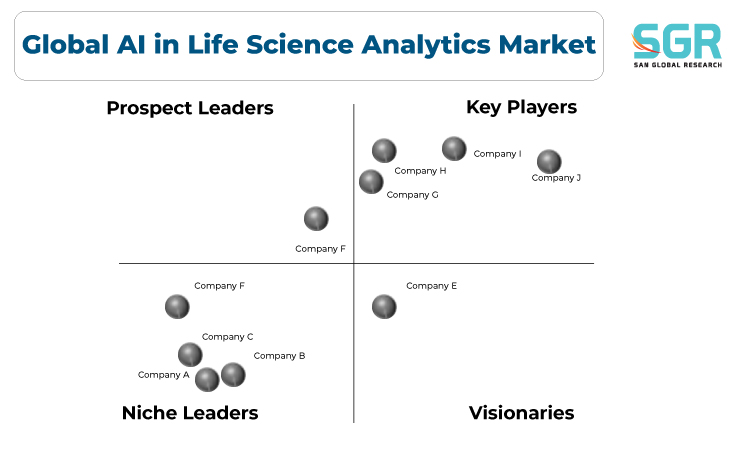

 Description
Description
 Gera Imperium Rise,
Gera Imperium Rise,  +91 9209275355
+91 9209275355


